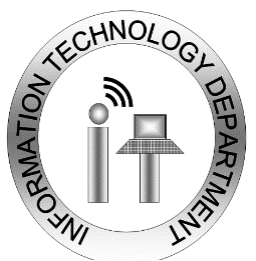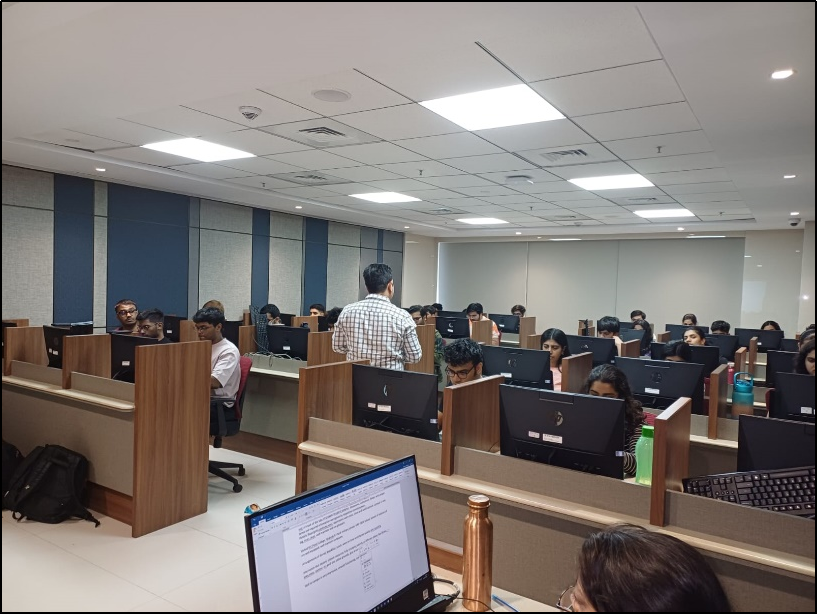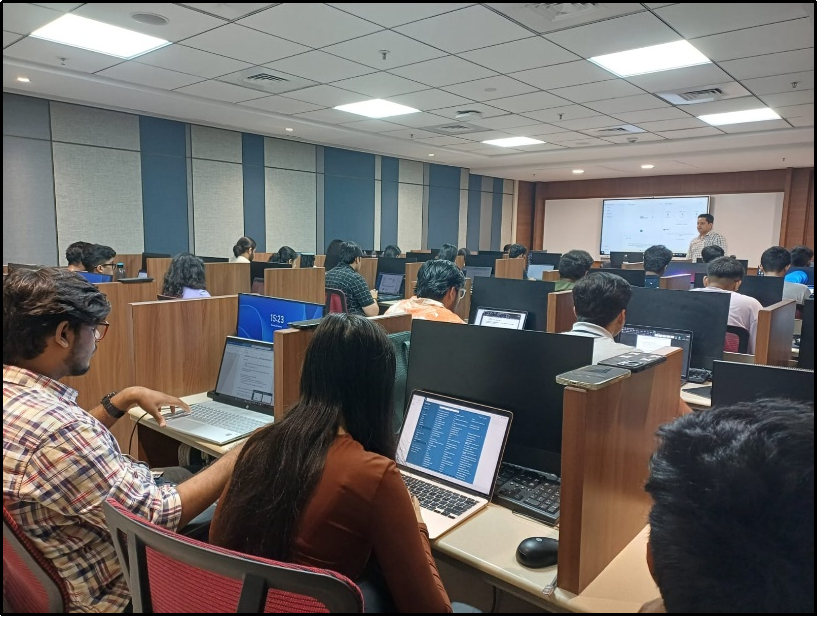
“Ideate. Innovate. Create.”
Department of Information Technology, one of the oldest departments of the school, was established in 2006. We offer undergraduate, integrated, and doctoral programmes. We have qualified and dedicated faculty members. Our Bachelor of Technology (Information Technology) programme is accredited by the National Board of Accreditation (NBA) under the Tier-I category. We are popular among students for our expertise in Computer Networks, Data Ware Housing and Mining, Data Analytics, Machine Learning and Artificial Intelligence, the Internet of Things, Cloud Computing, Cyber security, and Forensics. We hold a good rapport with several people in the industry and follow the changing trends. We are committed to facilitating an engaging learning environment with the use of traditional and innovative pedagogy.
The Department of IT will impart quality education and conduct research relevant to the needs of the national and international community, which will help to improve the quality of human life.
Program Outcomes:
PO6: The Engineer and The World: Analyze and evaluate societal and environmental aspects while solving complex engineering problems for its impact on sustainability with reference to economy, health, safety, legal framework, culture and environment. (WK1, WK5, and WK7).
PO7: Ethics: Apply ethical principles and commit to professional ethics, human values, diversity and inclusion; adhere to national & international laws. (WK9)
PO8: Individual and Collaborative Team work: Function effectively as an individual, and as a member or leader in diverse/multi-disciplinary teams.
PO9: Communication: Communicate effectively and inclusively within the engineering community and society at large, such as being able to comprehend and write effective reports and design documentation, make effective presentations considering cultural, language, and learning differences
PO10: Project Management and Finance: Apply knowledge and understanding of engineering management principles and economic decision-making and apply these to one’s own work, as a member and leader in a team, and to manage projects and in multidisciplinary environments.
PO11: Life-Long Learning: Recognize the need for, and have the preparation and ability for i) independent and life-long learning ii) adaptability to new and emerging technologies and iii) critical thinking in the broadest context of technological change. (WK8)
Program Specific Outcomes (PSOs) of IT Department
The department offers various undergraduate, integrated, and doctoral programmes.
The department has qualified and dedicated faculty members.
The research is an integral part of the Department of Information Technology. The department has strength in research domains like Networking, Internet of Things (IoT), Data warehousing and mining, Machine Learning and Artificial Intelligence, Wireless Sensor Networks, Human Computer Interaction (HCI), Sentiment Analysis, Cybersecurity, and Education Technology.
| Sr.No | Name | Title /Domain | Status |
|---|---|---|---|
| 1. | Mr.SudhirBagade | Wormhole Attack Detection in presence of Variable Delay in Mobile Ad hoc Network | PhD. Completed |
| 2. | Ms.Varsha Bhosale | Energy efficient TDMA based MAC Protocol for wireless sensor networks | Ph.D. Completed |
| 3. | Mr. Avinash More | Energy Efficient Routing Protocols in Wireless Sensor Networks | Ph.D. Completed |
| 4. | Mr. ShitalkumarJain | An Improvement in TCP Congestion Control for both wireless and wired N/W. | Ph.D. Completed |
| 5. | Ms. Seema Ladhe | A Resource Efficient Common Protection Path Approach for MPLS-based Recovery | Ph.D. Completed |
| 6 | Ms.Sneha Deshmukh | Handling congestion control for Internet of Things applications | Ph.D. In progress |
| 7 | Ms.Pankti Doshi | Program analysis | Ph.D. In progress |
| 8 | Ms.Chetashri Bhadane | Data Mining of Human Mobility Profile | Ph.D. In progress |
| 9 | Ms.Shubha Puthran | Intrusion detection using data mining | Ph.D. In progress |
| 10 | Ms. Vinaya Sawant | Distributed Association Rule Mining | Ph.D. In progress |
| 11 | Ms.Ashwini Rao | Feature Based Opinion Summarization | Ph.D. Completed |
| 12 | Ms.KrantiGhag | Sentiment Analysis for Text Reviews | Ph.D. Completed |
The Department of Information Technology has six well-equipped laboratories to meet the academic and research requirements of the students and faculty members. High-speed Internet connectivity is provided to all networked machines. The Department is moving its labs to the Microsoft Intelligent Cloud to provide anytime anywhere access to students and faculty members.
All the classrooms are air-conditioned and equipped with Smartboard, PA System, and WiFi.
CR-31 (Seating Capacity – 60)
CR-32 (Seating Capacity – 30)
CR-33 (Seating Capacity – 60)
CR-34 (Seating Capacity – 30)
| No. | Name of the Laboratory | Courses conducted in the Laboratory |
|---|---|---|
| 1 | RESEARCH LAB 1 | 1. Software Engineering (SE), 2. Object Oriented Analysis & Design (OOAD) 3. System & security (SS), E-commerce (ECOM) 4. Microprocessor-microcontroller (MPMC) 5. Computer simulation and modelling (CSM) 6. Web Programming (WP) 7. Data structure analysis (DSA) 8. Programming for problem solving(PPS) 9. Service Oriented Architecture (SOA) |
| 2 | RESEARCH LAB 2 | 1. Programming in Analytics (PA) 2. Business Visualization (BV) 3. Database management system (DBMS) 4. Object Oriented Analysis & Design (OOAD) 5. System & security (SS) 6. E-commerce (ECOM) 7. Microprocessor-microcontroller (MPMC) 8. Web Programming (WP) 9. Data structure analysis (DSA) 10. Programming for problem solving(PPS) 11. Service Oriented Architecture (SOA) |
| 3 | DATA STRUCTURES & DBMS LAB | 1. Implementation of Technology (IOT) 2. Distributed computing (DC) 3. Human computer Interface (HCI) 4. E-Commerce (ECOM) 5. Mobile application Development (MAD) 6. Programing for problem solving (PPS) 7. Data structure and algorithm (DSA) 8. Programming workshop (PW) 9. Software Project Management (SPM) |
| 4 | COMPUTER ARCHITECTURE &NETWORK (CISCO) LAB | 1. Computer Network (CN) 2. Advance computer Network (ACN) 3. Microprocessor-microcontroller (MPMC) 4. Parallel computing (PC) 5. Information security (IS) 6. Research Methodology (RM) |
| 5 | OPERATING SYSTEM AND PROGRAMMING LAB | 1. Operating System(OS), 2. Implementation of Technology (IOT) 3. Wireless Network(WN) 4. Parallel Computing(PC) 5. Microprocessor-Microcontroller (MPMC) 6. Business Visualization (BV) |
| 6 | PROJECT LAB | 1. E-commerce (ECOM), 2. Principle of Communication (PCOM) 3. Programming for problem solving(PPS) 4. Advanced Database management system (ADBMS) |


The library is the heart of knowledge and information. It is an essential and integral component of the institute. The library supports the teaching, learning, and research activities of the institute. It has a rich collection of print and non-print resources on Engineering, Technology, Management, and allied subjects. The well-furnished, air-conditioned, and Wi-Fi-enabled library is located on the ground floor of the institute. It is spacious and comfortable and it is managed by trained library professionals who assist the library users effectively and promptly. The main library has an area of 231.68 Sq. Mts., with a seating capacity of 110. The library’s working hours on all working days are 8.00 am to 8.00 pm. The library consists of two parts: 1. Stacking with a reading area and 2. Administrative area with circulation section. The development and growth of the library are planned under the leadership of the Library Advisory Committee.
Head of the Department, Information Technology
Professor & Associate Dean (Accreditation)
Assistant Professor
Associate Professor
Assistant Professor
Assistant Professor, Department of Information Technology, Program Coordinator MBATECH IT.
Assistant Professor(IT dept)
Assistant Professor
Assistant Professor
Assistant Professor
Assistant Professor
Assistant Professor
Assistant Professor
Assistant Professor
Assistant Professor
Lab Asst.
Lab Asst.
Lab Asst.
Lab Asst.
Assistant (Academic-Admin)